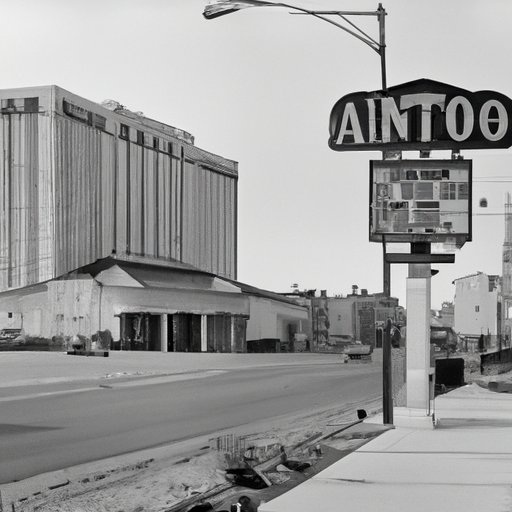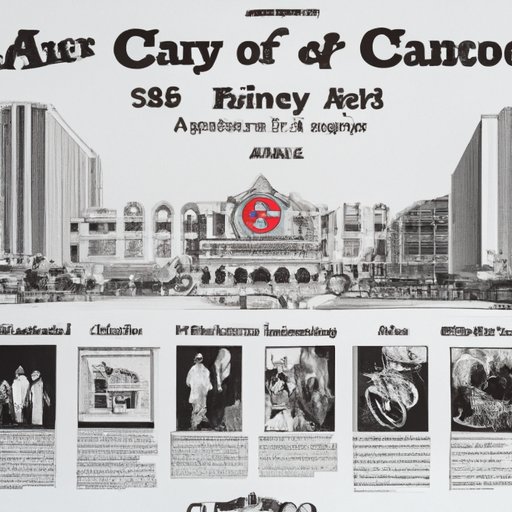The Rise of Atlantic City Casinos: A Historical Overview
Atlantic City is a popular tourist destination for its beautiful beaches, bustling boardwalk, and exciting casinos. Over the years, Atlantic City’s casino industry has undergone many changes, from the opening of the first casino in 1978 to the present day. In this article, we will explore the history of Atlantic City’s casinos, the impact they have had on the city and region, and the controversies and challenges that have arisen along the way.

A History of Atlantic City Casinos: From Their Opening to the Present Day
The first casino in Atlantic City, Resorts International, opened in 1978. At the time, it was the only true casino available on the east coast. This was a notable event for the city, as it marked a shift away from its traditional tourism industry to a more gambling-focused model.
The opening of Resorts International was followed shortly by the opening of other casinos in the area, including the Tropicana, Caesars, and Bally’s. These casinos, along with others that would follow in subsequent years, would transform Atlantic City into a major gambling destination.
Throughout the years, Atlantic City’s casinos have experienced both successes and challenges. These have included major events like Hurricane Sandy, which caused significant damage to the city’s casinos in 2012, and economic recessions that have impacted the industry’s profitability. Despite these challenges, Atlantic City’s casinos have remained a popular destination for visitors from all over the world.

Atlantic City Casinos: A Timeline of Their Opening and Events That Followed
Below is a chronological timeline of when each Atlantic City casino opened its doors to the public:
- Resorts International – May 26, 1978
- Caesars Atlantic City – June 26, 1979
- Bally’s Atlantic City – December 29, 1979
- Harrah’s Atlantic City – November 22, 1980
- Tropicana Atlantic City – November 23, 1981
- Golden Nugget Atlantic City – December 12, 1985
- Trump Plaza Hotel and Casino – May 14, 1984
- Trump Taj Mahal – April 2, 1990
- Atlantic City Hilton – December 29, 1980
- Sands Casino Hotel – August 13, 1980
- Trump Marina – June 26, 1985
- Showboat Casino Hotel – April 2, 1987
Each casino has a unique history, with notable events that have occurred at each establishment. For example, the Golden Nugget was one of the first casinos to offer a high-limit slot room, while the Trump Plaza Hotel and Casino was famous for hosting boxing matches and other sporting events. The Showboat Casino Hotel was known for its Mardi Gras theme and the House of Blues music venue, which brought in popular performers.
Atlantic City Casinos: How They Transformed and Modernized Since Opening
Over time, Atlantic City’s casinos have evolved to adapt to changing consumer tastes. This has meant incorporating new technology, such as online gambling and mobile apps, to keep up with the industry’s rapid pace of change. Casinos have also focused on modernizing their facilities to appeal to younger audiences, who may be more interested in experiences like live entertainment and nightlife rather than traditional casino gaming.
One of the most significant changes to the industry has been the legalization of online gambling in New Jersey. This has allowed Atlantic City casinos to offer their services online, giving visitors the ability to gamble from the comfort of their own homes. The move online has similarly led to the development of mobile apps, which allow users to place bets on their smartphones and tablets.
Who Opened the First Casino in Atlantic City? A Historical Account
The person who opened the first casino in Atlantic City was Merv Griffin, a successful television personality and businessman. Griffin was not originally from Atlantic City, but rather came to the area to invest in real estate. He saw an opportunity to invest in the casino industry and acquired the property that would become the site of Resorts International.
Griffin faced many challenges in opening the casino. There was significant opposition from local politicians who feared the social consequences of legalized gambling. Additionally, there were logistical challenges in building the casino, including issues with construction and financing.
Atlantic City Casinos: How They Shaped the City’s Reputation and Economy
The opening of Atlantic City’s casinos transformed the city’s reputation from a traditional tourist destination to a major gambling hub. The influx of visitors had a significant impact on the city’s economy, creating jobs and generating tax revenue for state and local governments.
However, there have been some downsides to the casino industry’s growth. Concerns have been raised over issues like crime, gambling addiction, and the decline of other businesses that were once a major part of Atlantic City’s tourism industry. Critics argue that the city has become too reliant on casinos, leading to a lack of diversity in its economy.

The Politics and Controversies Surrounding the Opening of Atlantic City Casinos
The opening of Atlantic City’s casinos was a major political issue in the state of New Jersey. There was significant opposition to the idea of legalized gambling, with some politicians arguing that it would lead to a rise in crime and other social problems.
Despite the opposition, Governor Brendan Byrne was a major advocate for bringing casinos to Atlantic City. His efforts were rewarded when the voters of New Jersey approved a referendum to legalize gambling in Atlantic City.
Over time, there have been various controversies and scandals related to Atlantic City’s casinos. These have included allegations of organized crime connections and concerns over corruption and lack of oversight.
How Atlantic City Casinos Competed Against Las Vegas and Other Gambling Destinations
Atlantic City’s casinos have always faced stiff competition from other gambling destinations, particularly Las Vegas. While both cities offer unique experiences, Atlantic City has struggled to keep up with the size and extravagance of Las Vegas’s casinos.
One way that Atlantic City’s casinos have tried to compete is by offering a more diverse range of experiences. In addition to gambling, many casinos in Atlantic City offer high-end restaurants, live entertainment venues, and other attractions. They have also focused on improving their facilities to better appeal to younger visitors, who may not be as interested in traditional casino gaming.
Conclusion
Atlantic City’s casinos have had a major impact on the city’s economy, reputation, and culture. While there have been controversies and challenges along the way, these casinos remain a popular destination for visitors from all over the world. The industry has had to adapt and evolve to keep up with changes in consumer preferences and technology, but its legacy lives on as an integral part of Atlantic City’s history and identity.
